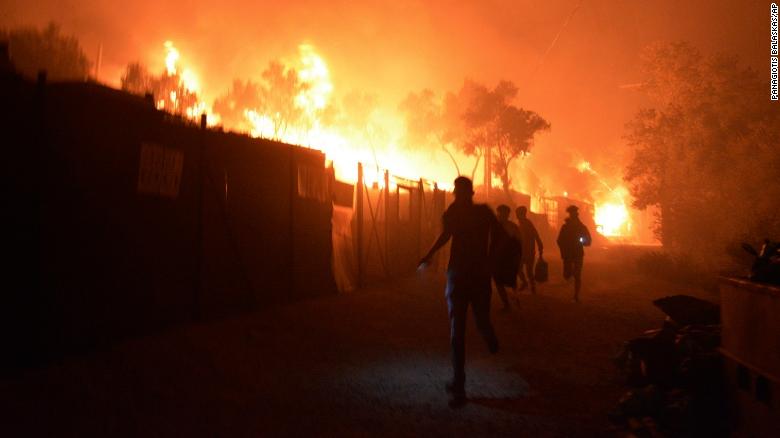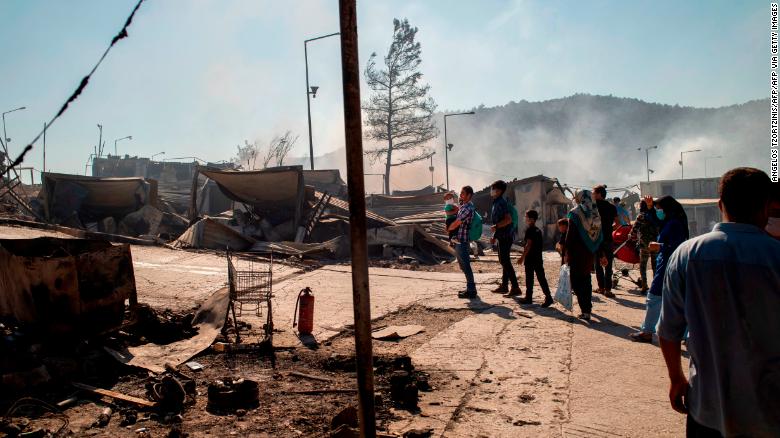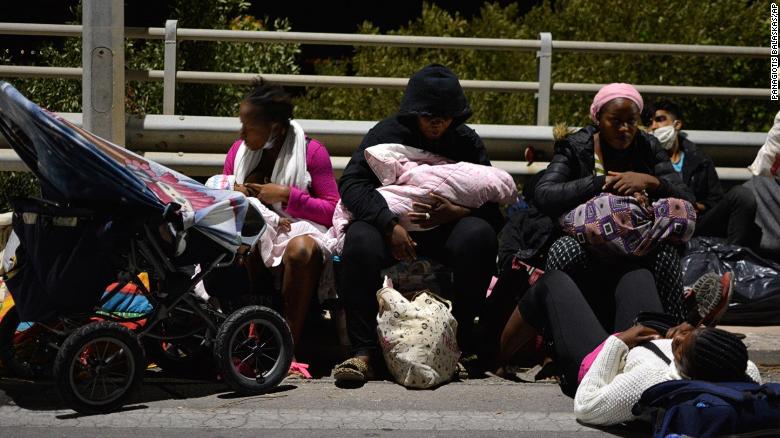Greece's Migrant State of Emergency
"Some people do not respect the country that is hosting them, and they strive to prove they are not looking for a passport to a better life.""They will not leave [the island] because of the fire."Greek government spokesman Stelios Petsas

"Under the stars, I'm going to sleep under the stars like all these people here.""[I've] nowhere to go since everything burned so we slept outside and we'll continue here."Leonie Raymon, refugee from Cameroon"In the past few days we've been living through unprecedented situations with daily fires.""We've reached our limits. We're anxious, we feel insecure, we're fed up, we don't know how to act anymore."Moria's municipal community leader Yiannis Mastroyannis"There is a terrible reality with these fires. Many children, women, men are in these camps in absolutely terrible conditions. We want to show solidarity with Greece that lives up to European values."French President Emmanuel Macron"I recognize the difficult conditions. However, nothing can become an alibi for violent reactions to health checks. And, much more, for riots of this magnitude.""The situation in Moria cannot continue because it is a matter of public health, humanity and national security at the same time."Greek Prime Minister Kyriakos Mitsotakis
 |
| Migrants flee from the Moria refugee camp during second a fire, on the northeastern Aegean island of Lesbos, Greece, on Wednesday, Sept. 9, 2020. (AP Photo/Petros Giannakouris) |
During
a huge migration wave that swamped Europe in 2015-16, with migrants
from the Middle East, Africa and Asia who left the nearby Turkish coast
with the intention of entering Europe by way of Greece and Italy, the
camp at Moria on the Greek Island of Lesbos was set up to accommodate
several thousand people. It ended up with many more than it was intended
to service, becoming a sprawling squalid camp, condemned by human
rights groups. For those who flooded into Greece, the intention was to
move on to wealthier European countries.
 Some,
like Germany, the destination of many of the migrants who knew of
German Chancellor Angela Merkel's willing absorption of a million
migrants was their target, but the state, under growing pressure from
alarmed German citizens along with violent incidents emanating from a
proportion of the migrants, reversed its earlier stance. Countries of
the European Union mandated to accept a share of the migrants to relieve
the burden on Italy and Greece, finally felt they had reached the
limits of their absorption capacity and balked at accepting additional
migrants.
Some,
like Germany, the destination of many of the migrants who knew of
German Chancellor Angela Merkel's willing absorption of a million
migrants was their target, but the state, under growing pressure from
alarmed German citizens along with violent incidents emanating from a
proportion of the migrants, reversed its earlier stance. Countries of
the European Union mandated to accept a share of the migrants to relieve
the burden on Italy and Greece, finally felt they had reached the
limits of their absorption capacity and balked at accepting additional
migrants.Now,
in the wake of a massive fire in the largest migrant camp for asylum
seekers in Europe, 12,500 migrants formerly placed under coronavirus
quarantine are without shelter. Authorities were faced with a
humanitarian crisis that eclipsed the one that existed prior to the
fire. At the same time Greek investigators are trying to figure out
whether a connection existed between the conflagration and anger on the
part of the migrants over an erupting camp outbreak of coronavirus.
 |
| Smoke rises at the burnt camp of Moria on the island of Lesbos on Wednesday the morning after a major fire broke out. |
According
to three eyewitnesses the fire began as a protest against mandatory new
quarantine measures. The blaze broke out after migrants who tested
positive for the virus or were exposed, refused to go into isolation,
according to a semi-official Greek news agency. Arson is being
investigated as a possible cause of the blaze. Overnight, people fled
the camp, as tents and shipping containers became engulfed in flames.
There were no injuries or deaths reported. But police surrounded the
camp attempting to ensure that the migrants remained within the vicinity
of the camp.
Moria
had been a site where protests, fatal fires and chronic sickness took
place, filled well beyond capacity, cited by international aid groups as
being unsafe and inhumane. It remained in operation not because Greece
wanted to continue hosting the migrants, but because there was simply
nowhere else for them to go. They kept arriving because the previous
waves had succeeded in distributing themselves around Europe. And more
latterly, Turkey used them as a threat to coerce Europe to fund its own
refugee camps.
"Events
in Moria last night are unthinkable but, tragically, predictable as the
dire situation on the islands has gone on for far too long",
the Greece country director for the International Rescue Committee --
Dimitra Kalogeropoulou noted of the residents that had fled from the
fire, but are "now left with nothing".
 |
| Refugees and migrants with their children gather on a bridge on Wednesday after the fire at the camp. |
Last
week officials visiting the camp had identified the first three
positive cornavirus case and a testing campaign that followed detected
another 35 positive cases, leading to the camp being placed under
lockdown. The new Greek government devised a blueprint to close Moria
and other island centres to create more permanent structures, in the
face of local resistance where the new permanent structures might be
placed.
Some
asylum seekers have been gradually transferred to the mainland. Other
European Union countries have agreed to accept some of the most
vulnerable among the migrants, unaccompanied minors in particular, to
rescue them from a camp that ended up holding ten times the number of
people it was originally designed to house.
 |
| People grasp for food on Thursday, September 10 after fires destroyed the Moria migrant camp on the Greek island of Lesbos |
Labels: Fire, Greece, Humanitarian Crisis, Lesbos, Migrant Camps

<< Home